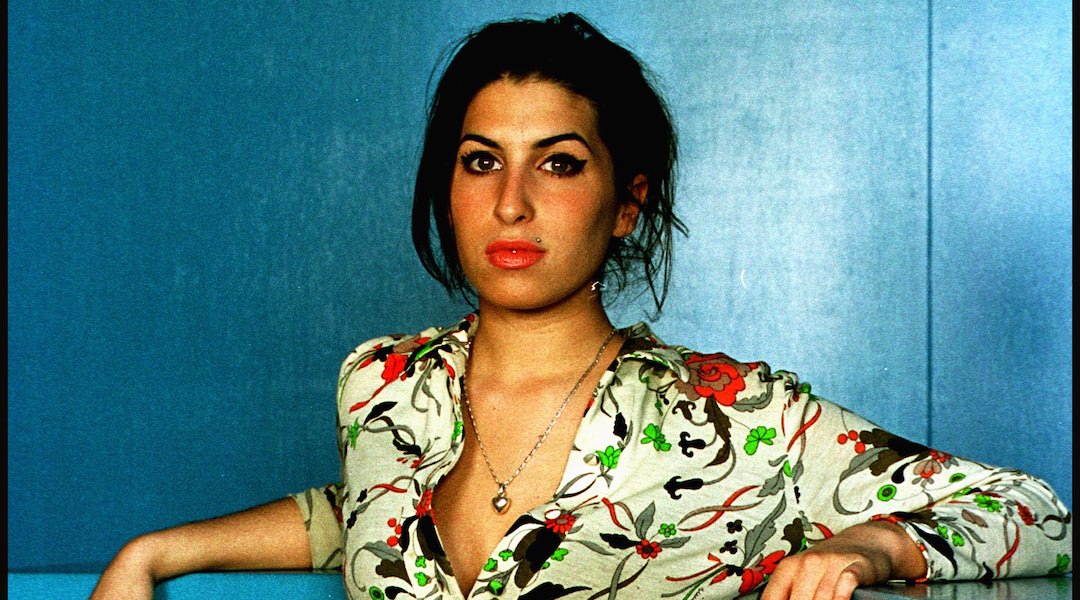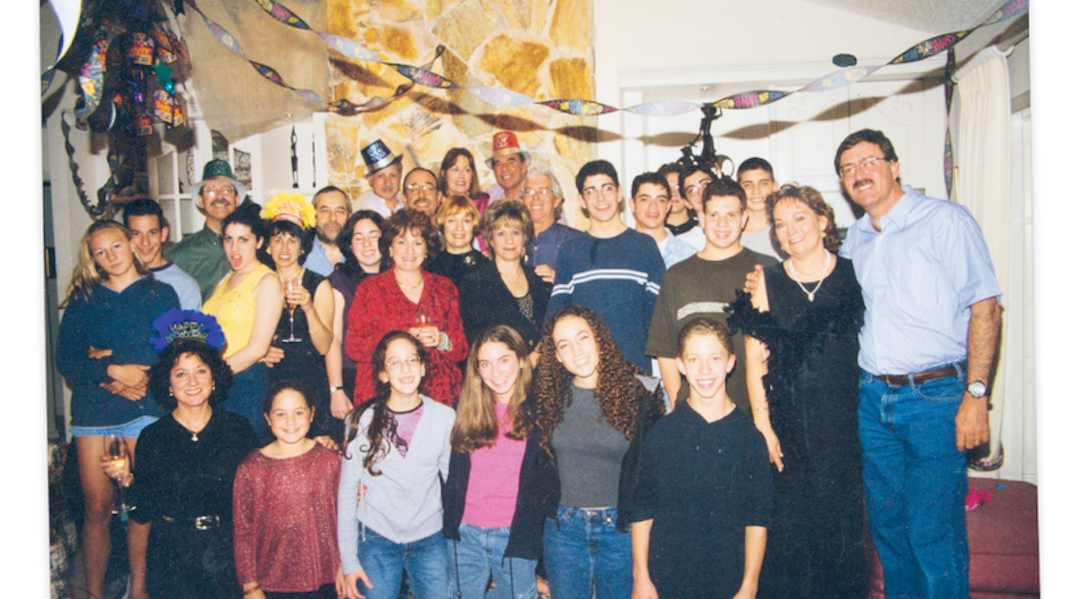10 Jewish Amy Winehouse moments (and photos) from a new book on her life
From bar mitzvahs to Jewish songs to her connection to Mark Ronson, her producer and a fellow English Jew

Amy Winehouse in 2004. (Paul Bergen/Redferns/Getty Images)
(JTA) — Amy Winehouse, the Jewish singer and songwriter whose soulful tunes about her dark personal life became influential pop hits, would have turned 40 this year. Her debut album “Frank” also turns 20 next month.
To mark the moment and to raise money for the Amy Winehouse Foundation, Winehouse’s family collected never-before-seen photographs, handwritten lyrics and excerpts from her diaries — from childhood to adulthood — and wrote “Amy Winehouse: In Her Words,” a biography of sorts to accompany them. On its website, the foundation lists recovery housing for women, music therapy and substance abuse education among its services.
Some have argued that Winehouse’s family — especially her father, Mitch, and her husband Blake Fielder-Civil — enabled her issues with drugs and alcohol. Winehouse first overdosed in 2007, and her father continued encouraging her to travel and perform, even filming documentary footage of an overdose recovery in Saint Lucia in 2009. The pop star died in 2011, and in “Amy,” a well-received documentary about her life from 2015, funeral-goers can be seen wearing kippahs.
But controversy aside, the Winehouse clan has faithfully chronicled Amy’s childhood and young adult years, when she attended a Jewish kindergarten, went to bat mitzvahs and enjoyed singing Jewish spiritual music in her free time. Although she was never observant as an adult (and said she hated going to Hebrew school on Sundays), Amy enjoyed Jewish holiday gatherings. She was also spotted wearing a Star of David necklace at times. In 2013, the Jewish Museum in London devoted an exhibit to her.
Here are 10 Jewish moments from the book, which was published this week.
She attended a Jewish nursery school.

Photos of an infant Amy. (Courtesy of The Amy Winehouse Foundation)
From the book: “[She] went to nursery at Yavneh School, which was attached to [London’s] Southgate Synagogue. She was never hard to spot, singing at the top of her lungs.”
She sat in the synagogue’s front row at her brother’s bar mitzvah.

(Courtesy of The Amy Winehouse Foundation)
Jewish music was a core part of her musical journey.
In addition to jazz, Jewish music was a big influence on Amy in her early years. She especially loved the Hanukkah song “Ma’oz Tzur.”
From the book: “Music also seeped effortlessly into Amy’s consciousness and she could recite lyrics and sing tunes after hearing a song maybe just once or twice. At her nan Cynthia’s house she was surrounded by jazz music: anyone from Frank Sinatra to Ella Fitzgerald to Sarah Vaughan. And at home she performed songs from the musical Mary Poppins or Jewish hymns that we’d taught her. She repeated one hymn, ‘Maʼoz Tzur’, over and over until she got it right. ‘Okay, Amy. Enough,’ was a familiar expression in our house as she sang continuously at the top of her voice.”
She once sang Jewish spiritual music on a Miami beach.
In 1997, Amy traveled to Miami with her mother, Janis, for a family bar mitzvah.
From the book: “Privately, however, Amy was honing her writing talent. Her notebooks from this time showed the reflections of a typical teenage girl trying to find her way in the world: going to parties and having crushes on boys. In 1997 for a break Janis took her to visit her family near Miami, where they attended a bar mitzvah on the beach. Amy set scribbling into her notebook and singing Jewish spiritual songs with her cousins.”
She sent her brother a letter with Hanukkah stamps.

(Courtesy of The Amy Winehouse Foundation)
The letter read: “Dear Ally, Miami great we’re great bar mitzvah great Cochrans great. You great? Weather good today beach & shopping! Miss you! Love Amy x + Mummy x PS. I can play the guitar! (Well, 5 chords) To Mr A. Winehouse London, ENGLAND
From the book: She learned five chords on the guitar and she couldn’t wait to tell her brother Alex. As much as Amy was failing at school, her musical and lyrical talent was developing.
She had American Jewish relatives in Florida.

Winehouse, in the yellow shirt on left, seen at a family gathering in Florida. (Courtesy of The Amy Winehouse Foundation)
The caption for this photo, from the book: Amy with Janis and her American family in Florida at her twin cousins’ Bar Mitzvah. Amy spent much of that holiday either practicing guitar chords from Alanis Morissette songs or jotting down her own compositions.
She connected with her producer, Mark Ronson, over their shared Anglo-Jewish identity.
Ronson — who would go on to work with other superstar artists such as Lady Gaga and Bruno Mars — also seemed to give her the creative freedom she needed. Amy felt an affinity with him as a Jewish boy from North London and responded well to his quiet manner.
She didn’t feel that Jewish identities were represented enough in theater or music.
She subsequently didn’t think she could be part of those worlds.
From a quote in the book: “When I was a little kid it was my dream to go to drama school, but it was never something I thought would happen to me…I was a Jewish girl from North London and things like that don’t happen to Jewish girls from North London called Amy Winehouse.”
She hoped that girls would see their most difficult experiences represented in her music.
From a quote in the book: “I’m not a girl’s girl. I was never part of a scene where I was the leader of a bunch of Jewish girls that sang jazz. I don’t know anyone like myself. I know that if I’m honest about myself and honest about my time and what I do with my life, I know that there are girls that will hear that and be like: I thought that, I’m not a dickhead. I’ve been through times I’ve been so fucked up about a situation that I’ve had to write everything down, and feelings I’ve had to acknowledge. Someone else might hear that and feel I’m not a mug for feeling those things about this man.”
Even during her grunge rock phase, her mom made her dress like a “normie” for this family bar mitzvah.

(Courtesy of The Amy Winehouse Foundation)
From the book: “Amy went through a teenage grunge phase but whenever she got dressed up she always looked lovely.”
This article originally appeared on JTA.org.















